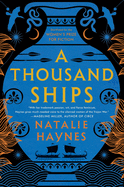
Known for her podcast Natalie Haynes Stands Up for the Classics, classicist and broadcaster Natalie Haynes (The Children of Jocasta; The Furies) reimagines the story of the Trojan War from the viewpoints of the women, both mortal and immortal, caught up in it.
When the poet asks Calliope the muse to sing, she grants his request, but only shows him events as they affect the women, telling the reader, "They have waited long enough for their turn." In shifting chronological order and settings across the Mediterranean region, readers see the war's impact. Hecabe and the Trojan women face slavery and degradation at the hands of the Greeks. Sea-goddess Thetis grieves for her son Achilles, but also regrets the insult of having a mortal son. Abandoned in Ithaca, Penelope writes Odysseus increasingly wry letters about his unusual difficulty in escaping the beds of beautiful women. A host of wives, mothers, warriors and goddesses come forward with insightful comments on the true cost of war and who must pay it.
Haynes draws on Homer for material but also looks farther afield, to Euripedes, Ovid and others, even including a blink-and-miss-it exchange similar to a moment from the classic film The Clash of the Titans. Although the women perhaps focus overmuch on the actions and feelings of the men rather than their own lives, overall Haynes has created a fine addition to the body of fiction striving to give silent women characters a voice. --Jaclyn Fulwood, blogger at Infinite Reads

